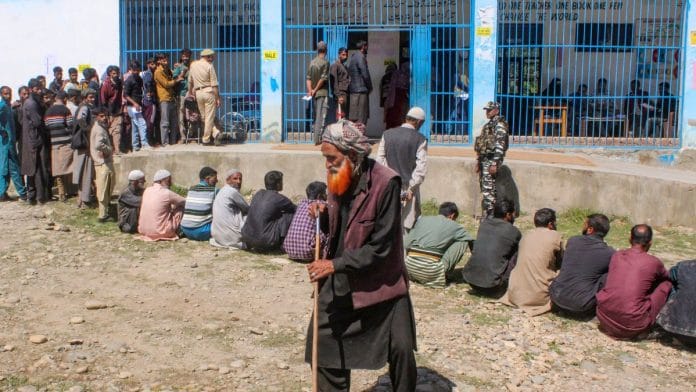People stood in long queues Wednesday to cast their vote in an Assembly election in Jammu and Kashmir after a gap of ten long years. PM Modi called it Naya Kashmir as he aimed his dart at the ‘teen khandan‘, the three dynasties—Congress, JKNC and PDP.
It’s been a long ten years in the Valley. There have been other decades marked by turbulence. But none like the past decade—a period of transformational change, depending on who is asked.
The ten years carry a lot of weight and significance. On 18 September, Kashmiris, for the first time, voted not for a state but a Union Territory. The region’s status changed in 2019, following the abrogation of Article 370 by the Modi government.
Many other firsts are also taking place during these keenly watched elections: Established political parties being pitched against several Independent candidates, who are backed by organisations like the banned Jamaat-e-Islami; the entry of Engineer Abdul Rashid; and the absence of stalwarts such as Mehbooba Mufti.
It’s led to the political landscape of Jammu and Kashmir becoming fiercely competitive, which is why the Assembly elections in Jammu and Kashmir is ThePrint’s Newsmaker Of The Week.
Also read: Why PM Modi & Amit Shah should, in national interest, defer plans for a BJP CM in Srinagar
High stakes for BJP
The main parties in the fray are the INDIA bloc’s National Conference (NC) and Congress, the People’s Democratic Party (PDP) and the Bharatiya Janata Party (BJP). During the last election BJP and PDP had entered into an alliance. This election also has the second-highest number of Independent candidates since 2008.
These elections carry a lot of political weight for the BJP, even beyond the region. The Modi government has been showcasing the abrogation of Article 370 as one of its key achievements.
After the recent delimitation exercise, Kashmir has 47 seats and Jammu has 43. Twenty-four Assembly seats in seven districts went to polls on Wednesday.
Delimitation led to an increase in seats in Hindu-dominated Jammu and nine seats being reserved for Scheduled Tribe community, the BJP is hoping to be a formidable force in Jammu even as it continues to face several challenges in the region.
When it comes to the Kashmir valley, BJP has very little influence.
For the National Conference too, these elections carry a lot of importance. Former CM of Kashmir and chairperson of NC, Omar Abdullah, lost to Engineer Rashid during the Lok Sabha elections. After making several statements about not contesting elections unless statehood is restored to J&K, he has decided to take the plunge.
BJP has also brought up statehood multiple times.
On 7 March this year, while launching an ‘Integrated Development of Hazratbal Shrine’ in Jammu and Kashmir, Prime Minister Narendra Modi made a strong emotional pitch to the people of J&K. He guaranteed to his “family in J&K” that “under no circumstances would development grind to a halt” in the UT.
Modi continued the same rhetoric on Thursday at the rally in support of BJP candidates in Srinagar’s Sher-e-Kashmir Stadium. He spoke about BJP’s promise to restore Jammu and Kashmir’s statehood, empowerment and development.
Also read: Modi is back. It took J&K, Haryana elections to make the PM break his self-imposed silence
Push for the electoral process
The withdrawal of Article 370 and statehood have emerged as major issues in these elections. Employment is also another significant concern.
Quite naturally, the people in the region are divided regarding Article 370. There is deep dissatisfaction in some circles regarding its abrogation.
And as candidates canvas the region, a sense of fear lingers in the air.
Dressed in a beige suit with a floral print and an off-white dupatta around her head, 36-year-old PDP leader Iltija Mufti waves to a group of women in a small village in Anantnag. An old woman holds her hands and tells her she wants to whisper something in her ears—her family member is languishing in jail due to a UAPA charge. Most political parties have promised to look into the issue of ‘innocent Kashmiris’ imprisoned under UAPA and PSA.
This air of dissatisfaction has played a significant role in connecting people with the election process. There was a 61.38 per cent turnout of voters in Jammu and Kashmir for the first phase of polling. It overtook the record-breaking turnout for the Lok Sabha elections this year, which was 58.46 per cent.
The fact that scores of people are coming out to vote shows how voting itself has become an act of resistance and solidarity.
This is in contrast to the last 30 to 40 years. Earlier, such discontent was used to support separatism and extremism, which led to appeals, threats and warnings to boycott the elections. But this time the long queues of voters did not allow that to happen.
But the most important feature of these elections is that they have been quite peaceful.
Views are personal.
(Edited by Theres Sudeep)






